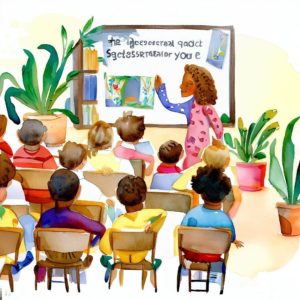
We’re all witnesses to the constant hustle and bustle of today’s world. The perpetual noise, the ever-beeping gadgets, and the unending need for attention. It’s a circus out there, and for children, this whirlwind of activity can be particularly overwhelming. Their minds, which are ever curious and constantly buzzing, can easily get entangled in a web of distractions. But here’s a nugget of wisdom: the key to helping children improve their focus might just be sitting in our gardens or balconies – yes, the solution could be our verdant companions, plants.
The Human-Nature Connection
Did you know there’s a scientific term for our deep-seated love for nature? It’s called biophilia. This inherent bond that humans, irrespective of age, share with the natural world can be a catalyst in helping navigate the labyrinth of today’s digital distractions. There’s something about the quiet charm of plants that provides a tranquil sanctuary amidst the hustle of life.
The Science Behind It
Here’s where it gets really fascinating. Research has repeatedly shown that spending time in nature, or even just being around plants, significantly improves attention restoration and cognitive function. The theory backing this is quite straightforward – interaction with natural elements offers effortless attention, thereby providing relief from the mental exhaustion brought on by our busy lives. It could be as simple as looking at a plant, touching its leaves, or smelling its blossoms – these interactions can promote relaxation, reduce stress, and enhance overall well-being.
Plants in Learning Environments

Let’s consider a scenario that most of us are familiar with – a classroom. A place where focus and attention are critical. By introducing elements of nature into this space, like potted plants or nature-themed pictures, we can observe a noticeable improvement in students’ attention spans and cognitive abilities. A fern sitting by the window or a collection of succulents on a shelf can stimulate children’s connection to nature. This stimulation, in turn, can lead to improved attention spans and cognitive functions.
More Than Just Focus
Introducing plants into children’s environments isn’t just about improving their ability to focus. It’s also about instilling a sense of responsibility and nurturing in them. Taking care of a plant can teach children about life cycles, the importance of care, and the joy of growth. These are valuable lessons that contribute significantly to their emotional development.
Making a Start
- Begin with small steps. It doesn’t have to be a massive overhaul of your child’s room or their classroom. A small potted plant on their study table or a weekly ‘nature hour’ in a nearby park can be good starting points.
- The aim is to integrate some aspect of the natural world into their daily routines. This simple change can have profound effects.
In the end, as adults, our responsibility extends beyond just providing for the younger generation. We must guide them towards what truly matters. Helping them disconnect from unnecessary distractions and reconnect with nature is a big step in that direction.
So, the next time your child seems to be struggling to focus, remember, you’ve got a potent tool at your disposal. Invite the tranquility and beauty of plants into your child’s life and watch them bloom alongside.
Recap
It’s undeniable – plants have a magic of their own. They calm us, help us focus, and even boost our moods. When it comes to children, this magic multiplies. From enhanced focus to the joy of nurturing a living thing, the benefits of integrating plants into children’s lives are many. Let’s help our children tap into the power of plants and witness the positive changes that unfold.






